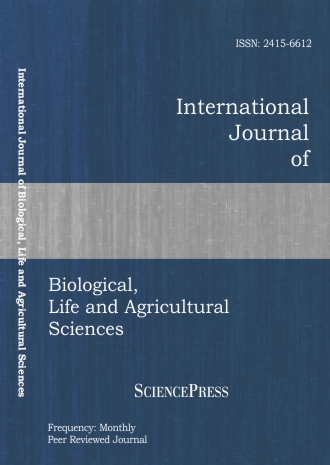
Scholarly
Volume:8, Issue: 10, 2014 Page No: 1115 - 1118
International Journal of Biological, Life and Agricultural Sciences
ISSN: 2415-6612
Isolation and Identification Fibrinolytic Protease Endophytic Fungi from Hibiscus Leaves in Shah Alam
Fibrin degradation is an important part in prevention
or treatment of intravascular thrombosis and cardiovascular diseases.
Plasmin like fibrinolytic enzymes has given new hope to patient with
cardiovascular diseases by treating fibrin aggregation related diseases
with traditional plasminogen activator which have many side effects.
Various researches involving wide range of sources for production of
fibrinolytic proteases, from bacteria, fungi, insects and fermented
foods. But few have looked into endophytic fungi as a potential
source. Sixteen (16) endophytic fungi were isolated from Hibiscus sp.
leaves from six different locations in Shah Alam, Selangor. Only two
endophytic fungi, FH3 and S13 showed positive fibrinolytic protease
activities. FH3 produced 5.78cm and S13 produced 4.48cm on Skim
Milk Agar after 4 days of incubation at 27°C. Fibrinolytic activity
was observed; 3.87cm and 1.82cm diameter clear zone on fibrin plate
of FH3 and S13 respectively. 18srRNA was done for identification of
the isolated fungi with positive fibrinolytic protease. S13 had the
highest similarity (100%) to that of Penicillium citrinum strain TG2
and FH3 had the highest similarity (99%) to that of Fusarium sp.
FW2PhC1, Fusarium sp. 13002, Fusarium sp. 08006, Fusarium
equiseti strain Salicorn 8 and Fungal sp. FCASAn-2. Media
composition variation showed the effects of carbon nitrogen on
protein concentration, where the decrement of 50% of media
composition caused drastic decrease in protease of FH3 from 1.081 to
0.056 and also S13 from 2.946 to 0.198.